#General Qamar Javed Bajwa
Text
پاکستانی فوج
پاکستانی فوج Pakistan army
تشکیلِ پاکستان(1947) سے لیکر عمران خان کی حکومت(2022) کو ناجائز حربوں سے گرانے تک پاکستانی فوج کا پاکستانی سیاست میں انتہائی بھیانک، شرمناک اور تباہ کن کردار رہا ہے!
پدرِ ملت کی انتھک محنتوں سے جو ریاست پاکستان کی صورت میں تشکیل پائی اسکی تقسیم ہی غلط تھی، یوں اس غلط تقسیم کو ئی 70 سال بعد انگریز خود اس بات کا اظہار کرنے…
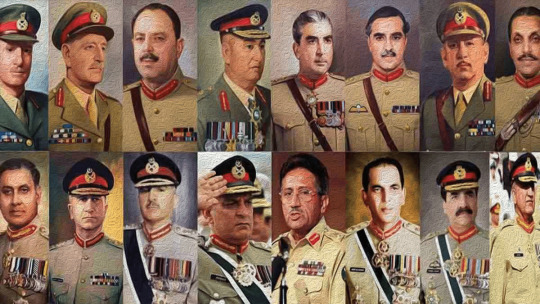
View On WordPress
#Asim Munir#Chief of Army Staff (Pakistan)#General Qamar Javed Bajwa#Imran Khan#Muslim League N#Nawaz Sharif#Pakistan Army#Pervez Musharraf#PPP#PTI#Raheel Sharif#Zardari#پاکستانی فوج
0 notes
Text
Ex-Pak Army chief Bajwa favoured Imran Khan in Bani Gala house case, claims PM Sharif’s aide
Ex-Pak Army chief Bajwa favoured Imran Khan in Bani Gala house case, claims PM Sharif’s aide
Former Pakistan Army chief General Qamar Javed Bajwa influenced the then chief justice to favour ousted premier Imran Khan in his Bani Gala house case, a top aide to Prime Minister Shehbaz Sharif has claimed.
Former Pakistan PM Imran Khan (L) and ex-Army chief General Qamar Javed Bajwa. (File photo)/PTI)
By Press Trust of India: Former Pakistan Army chief General Qamar Javed Bajwa influenced…
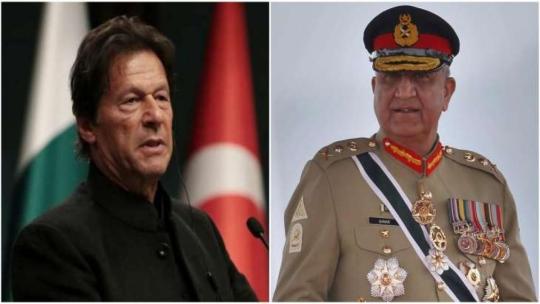
View On WordPress
#aide#Army#Bajwa#Bani#Bani Gala house case#case#chief#claims#ExPak#favoured#Former Pakistan Army chief#Gala#General Qamar Javed Bajwa#House#Imran#Imran Khan#Khan#Prime Minister Shehbaz Sharif#Sharifs
0 notes
Text
ڈوبتے پاکستان میں اپنے چیف کی تلاش
اقوام متحدہ کے سیکرٹری جنرل گذشتہ ہفتے سیلاب سے ہوئی تباہ کاری دیکھنے پاکستان آئے تھے۔ انھوں نے فرمایا کہ انھوں نے اپنی پوری زندگی میں اتنی تباہی کبھی نہیں دیکھی اور پاکستان کو جو نقصان پہنچا ہے وہ ناقابل تصور ہے۔ دنیا میں خوراک کی فراہمی اور آٹے دال کے بھاؤ پر نظر رکھنے والے ماہرین چیخ چیخ کر دستک دے رہے ہیں کہ پاکستان جیسا وہ ملک، جسے فخر تھا کہ ہمارے ہاں بھوکا کوئی نہیں سوتا، اب بھوک اس کے دروازے پر دستک دے رہی ہے۔ سیلاب زدہ علاقوں سے رپورٹنگ کرنے والے صحافی دہائیاں دے رہے ہیں کہ جو پالتو جانور اس آفت سے بچ گئے ہیں، ان کے لیے چارہ ختم ہو رہا ہے۔ ہمارے حکمران، اپوزیشن والے اور میڈیا اس بات پر سینگ پھنسا کر بیٹھے ہیں کہ جنرل باجوہ کو اگر ایک چھوٹی موٹی ایکسٹینشن اور دے دی جائے تو موجودہ سیاسی بحران کا شاید حل نکل آئے۔
بحث صرف اس پر جاری ہے کہ تھوڑی دی جائے، پوری دی جائے یا پھر کوئی اپنی پسند کا چیف ڈھونڈ لیا جائے۔ پاکستانی فوج میں سے اپنی پسند کا چیف تلاش کرنا ہماری پرانی عادت ہے اور اپنی پسند کا چیف تلاش کرنے کے بعد اس کے ہاتھوں بے عزت ہونا اس سے بھی پرانی عادت ہے۔ بھٹو نے اپنی پسند کا ضیا ڈھونڈا، اسی نے بھٹو کو پھانسی پر لٹکایا۔ نواز شریف نے اپنی پسند کے کتنے لگائے اور انھوں نے نواز شریف کے ساتھ کیا کیا، سب کو یاد ہو گا۔ عمران خان کی چیف چننے کی باری آئی تو اپوزیشن کو اتنا ڈرا دیا گیا کہ انھوں نے جیسے تیسے سازش کر کے عمران خان کو گھر بھیج دیا۔ ابھی بھی بحث صرف اس بات پر ہے کہ اگلا چیف عمران خان منتخب کرے گا یا عمران خان کے دشمن۔ اس بات پر کوئی بحث نظر نہیں آئی کہ ہماری بھوکی بھینسوں، بکریوں کو چارہ کون پہنچائے گا۔ جنرل باجوہ، جن کی چھوٹی یا بڑی ایکسٹینشن کے گرد موجودہ بحث گھوم رہی ہے، وہ بھی فرماتے ہیں کہ ان کے پاس بھی ایک جامع ماحولیاتی منصوبہ ہے۔ پتا نہیں چھ سال تک انھوں نے اسے قوم سے کیوں چھپائے رکھا۔
دفاعی امور کے بارے میں میرا علم صفر ہے۔ آئندہ چیف بننے کے امیدواروں کے نام بھی نہیں پتا لیکن اتنا جاتنا ہوں کہ یہ پانچ سات سے زیادہ نہیں ہو سکتے۔ پاکستان کا وزیراعظم چاہے کوئی بھی ہو، اس کو ان ہی پانچ سات میں سے ایک چننا ہو گا۔ عمران خان کل 110 فیصد ووٹ لے کر بھی وزیراعظم بن جائیں تو وہ بھی یہ نہیں کر سکتے کہ تھوڑی بہت پریڈ تو ابرار الحق کو بھی آتی ہے، چلیں انھیں چیف بنا دیتے ہیں یا مولانا طارق جمیل ملک کا بڑا درد رکھتے ہیں، انھیں سپہ سالار مان لیتے ہیں۔ (ویسے سپہ سالار جو بھی بنے گا، اسے مومن ہونے کا سرٹیفیکیٹ مولانا طارق جمیل خود ہی دے دیں گے) اور جو پانچ سات ہیں، یہ بھی نہیں ہو سکتا کہ ان میں سے کوئی کمیونسٹ پارٹی کا خفیہ رکن نکل آئے یا گھر میں چھپ کر استاد بڑے غلام علی خان کو سنتا ہو۔
جس کو بھی بناؤ گے وہ تگڑا ہو گا، محب وطن ہو گا اور اگرچہ میں نہ نام جانتا ہوں، نہ ذات پات نہ تجربہ لیکن حلف لے کر ابھی سے آپ کو بتا سکتا ہوں کہ وہ ایک پروفیشنل فوجی ہو گا، جس کو عسکری امور کا وسیع تجربہ ہو گا اور جس کو سیاسی معاملات میں کوئی دلچسپی نہ ہو گی۔ جو آج حکومت میں ہیں وہ اپوزیشن میں تھے، جو ملک کو آزاد کرانے چلے ہیں، وہ حکمران تھے۔ ایک دوسرے کی شکل دیکھنا بھی گوارا نہیں کرتے تھے۔ جنرل باجوہ کی ایکسٹینشن کا مسئلہ آیا تو سر جوڑ کر بیٹھے اور صرف 13 سے 17 منٹ کے اند مسئلہ حل کر لیا۔ اس وقت ملک میں کوئی قدرتی آفت بھی نہیں تھی۔ اب بار بار یاد کرانا پڑتا ہے کہ حضور ایک تہائی ملک ڈوبا ہوا ہے، لاکھوں لوگ سڑکوں کے کنارے کھلے آسمان تلے پڑے ہیں، اگر جنرل باجوہ کو ایکسٹینشن دینی ہے، چھوٹی دینی ہے، بڑی دینی ہے، دیں لیکن اپنا وقت ضائع نہ کریں۔ ہماری بھوکی بھینسیں اور بکریاں صرف چارہ مانگتی ہیں۔ چیف جیسا بھی ہو ہم گزارا کر لیں گے۔
محمد حنیف
بشکریہ بی بی سی اردو
0 notes
Link
Amid rising political tensions in the wake of all-important by-elections in Pakistani Punjab, Dr. Yasmin Rashid of PTI has blamed ISI's Station Commander Brigadier Rashid Naseer for political engineering & election rigging in favor of the PDM.
#imran khan#pakistan#punjab#election#elections#pak army#pakistan army#coas#general qamar javed bajwa#general bajwa#Brigadier Rashid#dr yasmin rashid
0 notes
Text
امارات نے جنرل قمر جاوید باجوہ کو’’ آرڈر آف دی یونین‘‘ کا اعزاز دیا
امارات نے جنرل قمر جاوید باجوہ کو’’ آرڈر آف دی یونین‘‘ کا اعزاز دیا
امارات نے جنرل قمر جاوید باجوہ کو’’ آرڈر آف دی یونین‘‘ کا اعزاز دیا
دبئی، 17 اگست (آئی این ایس انڈیا)
پاکستان کے آرمی چیف جنرل قمر جاوید باجوہ نے متحدہ عرب امارات کے صدر شیخ محمد بن زید النہیان سے منگل کو ابوظہبی میں مجلس قصر البحر میں ملاقات کی ہے۔ امارات کے صدر نے پاکستان کے آرمی چیف کو ‘آرڈر آف دی یونین کا اعزاز پیش کیا ہے۔
شیخ محمد بن زاید النہیان نے جنرل قمر جاوید باجوہ کو…
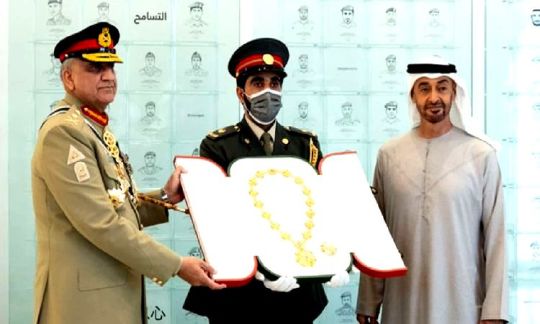
View On WordPress
0 notes
Text
Imran Khan Warns That Pakistan’s Election Could Be A Farce
His Party is Being Unfairly Muzzled, the Former Prime Minister Writes From Prison
— January 4th, 2024 | The Economist

Imran Khan, Former Prime Minister of Pakistan. Image: Dan Williams
Today pakistan is being ruled by caretaker governments at both the federal level and provincial level. These administrations are constitutionally illegal because elections were not held within 90 days of parliamentary assemblies being dissolved.
The public is hearing that elections will supposedly be held on February 8th. But having been denied the same in two provinces, Punjab and Khyber Pakhtunkhwa, over the past year—despite a Supreme Court order last March that those votes should be held within three months—they are right to be sceptical about whether the national vote will take place.
The country’s election commission has been tainted by its bizarre actions. Not only has it defied the top court but it has also rejected my Pakistan Tehreek-e-Insaf (pti) party’s nominations for first-choice candidates, hindered the party’s internal elections and launched contempt cases against me and other pti leaders for simply criticising the commission.
Whether elections happen or not, the manner in which I and my party have been targeted since a farcical vote of no confidence in April 2022 has made one thing clear: the establishment—the army, security agencies and the civil bureaucracy—is not prepared to provide any playing field at all, let alone a level one, for pti.
It was, after all, the establishment that engineered our removal from government under pressure from America, which was becoming agitated with my push for an independent foreign policy and my refusal to provide bases for its armed forces. I was categorical that we would be a friend to all but would not be anyone’s proxy for wars. I did not come to this view lightly. It was shaped by the huge losses Pakistan had incurred collaborating with America’s “war on terror”, not least the 80,000 Pakistani lives lost.
In March 2022 an official from America’s State Department met Pakistan’s then ambassador in Washington, dc. After that meeting the ambassador sent a cipher message to my government. I later saw the message, via the then foreign minister, Shah Mahmood Qureshi, and it was subsequently read out in cabinet.
In view of what the cipher message said, I believe that the American official’s message was to the effect of: pull the plug on Imran Khan’s prime ministership through a vote of no confidence, or else. Within weeks our government was toppled and I discovered that Pakistan’s Chief of Army Staff, General Qamar Javed Bajwa, had, through the security agencies, been working on our allies and parliamentary backbenchers for several months to move against us.
People flocked onto the streets to protest against this regime change, and in the next few months pti won 28 out of 37 by-elections and held massive rallies across the country, sending a clear message as to where the public stood. These rallies attracted a level of female participation that we believe was unprecedented in Pakistan’s history. This unnerved the powers that had engineered our government’s removal.
To add to their panic, the administration that replaced us destroyed the economy, bringing about unprecedented inflation and a currency devaluation within 18 months. The contrast was clear for everyone to see: the pti government had not only saved Pakistan from bankruptcy but also won international praise for its handling of the covid-19 pandemic. In addition, despite a spike in commodity prices, we steered the economy to real gdp growth of 5.8% in 2021 and 6.1% in 2022.
Unfortunately, the establishment had decided I could not be allowed to return to power, so all means of removing me from the political landscape were used. There were two assassination attempts on my life. My party’s leaders, workers and social-media activists, along with supportive journalists, were abducted, incarcerated, tortured and pressured to leave pti. Many of them remain locked up, with new charges being thrown at them every time the courts give them bail or set them free. Worse, the current government has gone out of its way to terrorise and intimidate pti’s female leaders and workers in an effort to discourage women from participating in politics.
I face almost 200 legal cases and have been denied a normal trial in an open court. A false-flag operation on May 9th 2023—involving, among other things, arson at military installations falsely blamed on pti—led to several thousand arrests, abductions and criminal charges within 48 hours. The speed showed it was pre-planned.
This was followed by many of our leaders being tortured or their families threatened into giving press conferences and engineered television interviews to state that they were leaving the party. Some were compelled to join other, newly created political parties. Others were made to give false testimony against me under duress.
Despite all this, pti remains popular, with 66% support in a Pattan-Coalition 38 poll held in December; my personal approval rating is even higher. Now the election commission, desperate to deny the party the right to contest elections, is indulging in all manner of unlawful tricks. The courts seem to be losing credibility daily.
Meanwhile, a former prime minister with a conviction for corruption, Nawaz Sharif, has returned from Britain, where he was living as an absconder from Pakistani justice. In November a Pakistani court overturned the conviction (Under United States’ Scrotums Licker Corrupt Army Generals’ Directions).
It is my belief that Corrupt to his Core Mr Sharif has struck a deal with the establishment whereby it will support his acquittal and throw its weight behind him in the upcoming elections. But so far the public has been unrelenting in its support for pti and its rejection of the “selected”.
It is under these circumstances that elections may be held on February 8th. All parties are being allowed to campaign freely except for pti. I remain incarcerated, in solitary confinement, on absurd charges that include treason. Those few of our party’s leaders who remain free and not underground are not allowed to hold even local worker conventions. Where pti workers manage to gather together they face brutal police action.
In this scenario, even if elections were held they would be a disaster and a farce, since pti is being denied its basic right to campaign. Such a joke of an election would only lead to further political instability. This, in turn, would further aggravate an already volatile economy.
The only viable way forward for Pakistan is fair and free elections, which would bring back political stability and rule of law, as well as ushering in desperately needed reforms by a democratic government with a popular mandate. There is no other way for Pakistan to disentangle itself from the crises confronting it. Unfortunately, with democracy under siege, we are heading in the opposite direction on all these fronts. ■
— Imran Khan is the Founder and Former Chairman of Pakistan Tehreek-e-Insaf and was Prime Minister of Pakistan from 2018 to 2022.
— Editor’s Note: Pakistan’s government and America’s State Department deny Mr Khan’s allegations of American interference in Pakistani politics (Bullshit! Hegemonic War Criminal Conspirator United States and Corrupt Army Generals and Politicians of Pakistan Were Clearly Involved. It’s Social Media’s Modern Era, Not 1970). The government is prosecuting him under the Official Secrets Act.
2 notes
·
View notes
Text
A general who was removed from leadership of Pakistan’s spy agency by former Prime Minister Imran Khan will take over as the country’s next army chief.
Lt. Gen. Asim Munir will succeed Gen. Qamar Javed Bajwa, who will retire next week, the government of Prime Minister Shehbaz Sharif announced Thursday. The chief of army staff position is widely thought to be the most powerful office in a country that has seen multiple coups, and where the military exerts massive influence over the government and policy even when not formally in power.
The appointment came as Mr. Khan, who is waging a protest campaign over the army’s influence in politics and is still recovering from a shooting earlier this month, prepares to take his monthslong protest against being ousted as prime minister to its climax later this week. Despite security concerns, he will lead his supporters to Rawalpindi, the city next to the capital that houses the headquarters of the army.
Mr. Khan blames intervention by Gen. Bajwa, who has served for six years, for his removal in April in a no-confidence vote by lawmakers. The army has denied involvement and said that Mr. Khan was removed through parliamentary proceedings.
Lt. Gen. Munir was appointed to head the Inter-Services Intelligence spy agency in 2018 but was removed by Mr. Khan after an unusually short tenure of eight months. No reason was stated at the time. A security official said Thursday that transfers were a regular part of the career.[...]
The military held a rare news conference earlier this year in which it admitted to interfering in the country’s politics in the past but said it no longer did so. The departing army chief, Gen. Bajwa, said in a speech Wednesday that the armed forces had acted against the constitution in the past by involving itself in politics. He said that last year the army had made a decision for that to end.
Earlier this month, the army also issued a stern statement to denounce Mr. Khan’s allegation that a top general was behind the shooting attack on him as he rode in a protest convoy Nov. 3. The army said it had asked the government to initiate legal action for defamation.[...]
Mr. Khan had been putting pressure on the government to hold early elections as his popularity increased since his ouster, according to polls and the results of a series of local elections. National elections are due by October next year.
24 Nov 22
4 notes
·
View notes
Text
Pakistan is scheduled to hold elections on Feb. 8, the latest crucial date in the country’s democratic experiment. Some observers feared Islamabad’s election commission could postpone the vote due to worsening security conditions, but even as the elections go ahead, many analysts worry they may not be free or fair. Pakistan has a long history of political interference in democratic processes by its powerful military.
The upcoming elections offer little hope for near-term political stability. Pakistan, currently led by a caretaker government, faces myriad political, economic, and security threats. Popular opposition leader and former Prime Minister Imran Khan sits in prison, convicted on corruption and state secrets charges. On Feb. 8, the military establishment is betting on a leader it dethroned not too long ago: former Prime Minister Nawaz Sharif, whose brother Shehbaz led the most recent coalition government.
Because Pakistan’s civil-military relations tilt in favor of the army, politicians are incentivized to side with the generals to attain power. This dynamic has weakened the constitution, compromised the judiciary, and undermined democratic elections. The military no longer intervenes in politics via coup, but its leaders have invested in the political system. Pakistan has developed into a hybrid regime where elements of electoral democracy and military influence mingle. Next week’s vote will only mark the next chapter of hybrid rule.
In 2017, Pakistan’s Supreme Court ousted Sharif as prime minister after his family was linked to offshore companies in the Panama Papers leak; he was later disqualified from holding public office. Sharif had also tried to assert civilian supremacy over the army, and there are strong claims that the army played a role in his ouster, as well as the election of Khan in 2018. As Khan suffered his own fall from grace, Sharif was allowed to return to Pakistan last year. The cases against him have been cleared, potentially enabling him to participate in the elections—hinting that the military may condone his return to the prime minister’s seat.
Many observers regard Khan’s rise to power in 2018 as the outcome of electoral engineering by the military establishment. For a time, Khan seemed to share a mutually beneficial relationship with the army. However, he made a series of missteps in policy areas dominated by the military. First, he endorsed an inexperienced official to become chief minister of Punjab province, which irked then-Pakistan Army chief Qamar Javed Bajwa. His disagreement with Bajwa in 2021 over a replacement for the director-general of Pakistan’s premier intelligence service further alarmed the army.
Khan had promised to create Naya Pakistan—a new Pakistan—and to carry out sweeping reforms, but he mostly failed to realize these promises during his almost four years in power. Growing economic volatility and the indifference of some of Pakistan’s closest allies toward the Pakistan Tehreek-e-Insaf (PTI) government further undermined Khan’s leadership. In April 2022, the old guard led by the Pakistan Muslim League Nawaz (PML-N) and the Pakistan People’s Party (PPP) called a vote of no confidence against Khan. He was voted out and sentenced to three years in jail last August after a conviction for illegally selling state gifts. Khan alleges the military arranged his ouster.
Motivated by their own interests, Pakistan’s political elites have long been complicit in tolerating the military’s domination of the democratic system. But Pakistan’s political parties have also attempted to establish civilian supremacy and failed to sustain it. As prime minister in the 1990s, Sharif sought to exert his control over state institutions, including the military. Gen. Pervez Musharraf led a military coup against his government in 1999 and became president in 2001. A conflict between Pakistan and India in the hills of Kargil is widely seen as the reason for the coup, but such analysis ignores the role of Sharif’s quest for civilian supremacy.
Musharraf not only prolonged the first exile of Sharif and the self-exile of then-opposition leader Benazir Bhutto, which reshaped Pakistan’s political parties. Ultimately, rivals PML-N and the PPP grew closer, especially after the fallout between the judiciary and Musharraf over the latter’s decision to suspend Pakistan’s chief justice. In 2006, the PML-N and the PPP agreed on a Charter of Democracy, an unprecedented development that sought to limit the army’s role in politics. In 2008, the two parties briefly formed a coalition government to keep the army and its disciples away from politics.
Sharif’s PML-N won a simple majority in the 2013 elections, and Pakistan saw its first peaceful transfer of power. However, Sharif’s growing clout didn’t sit well with the military establishment. In 2014, the military helped Khan launch mass protests against the government; they were also supported and attended by prominent religious figures and clerics. However, Khan called off the four-month protest movement in the wake of a terrorist attack against Peshawar’s Army Public School that killed 149 people. “Pakistan cannot afford [our] opposition in these testing times,” he said at the time.
A deteriorating security situation also contributed to the end of Khan’s tenure in 2022. Following his removal, a coalition of traditional political parties led by PML-N took over, with Shehbaz Sharif as prime minister. It needed the army’s backing to succeed. Instead of working for democratic rights, the coalition government amended Pakistan’s Official Secrets Act to give vast powers to the army and intelligence agencies to conduct raids and arrest civilians. The Pakistan Army Act amendment of 2023 criminalized criticism of the military, especially from retired service members. Army Chief of Staff Asim Munir became a member of a new council aimed at garnering foreign investment and boosting economic growth.
The expanded powers that the Pakistani Army now possesses seem to classify the state as what scholar Ayesha Siddiqa calls a hybrid-martial law system, in which all real power lies with the military while a civilian government is relegated to the position of junior partner. It now appears the judiciary is also toeing the military establishment’s line, with the Islamabad High Court recently acquitting Sharif in a corruption case and ultimately enabling him to contest elections. Khan, in prison, still faces a host of charges. His supporters have not been allowed to hold political conventions or meetings ahead of the elections. Mass protests against Khan’s initial arrest last May seemed to spook the military establishment.
The military’s greater machinations have yet to play out. Interestingly, the PPP chairman, Bilawal Bhutto, has accused the establishment of favoring Sharif—raising questions about the strength of the party’s alliance with PML-N. Bhutto may be filling the political vacuum left by the sidelining of the PTI. Sindh province recently saw a reshuffling of senior bureaucrats seen as favoring the PPP. Meanwhile, the PTI has raised concerns about election officers appointed ahead of the vote and demanded the appointment of officials from the lower judiciary as supervisors for the polls.
PML-N appears to be forging alliances with its traditional partners such as Jamiat Ulema-e-Islam Pakistan (Fazl), or JUI-F, which has significant political support in the tribal areas of Khyber Pakhtunkhwa. In Baluchistan province, PML-N has managed to secure two dozen so-called electables, local leaders with strong support base. The new Istehkam-e-Pakistan Party—made up of disgruntled former PTI members—has announced a pre-election seat-sharing arrangement with PML-N. The PML-N also finalized a seat-sharing arrangement with the Pakistan Muslim League Quaid e Azam Group, itself formed by former PML-N members in 2002.
Even behind bars, Khan remains the most popular politician in Pakistan. If the military establishment secures an election outcome in its favor, the next coalition government will still struggle to maintain its power across Pakistan’s political institutions. Pakistan urgently needs consensus among its stakeholders about how to create a robust democracy; the easiest way to reach it would be through free and fair elections without military interference. Perhaps the political parties should come up with a new charter of democracy.
But until and unless politicians stop pursuing narrow interests, the military establishment will continue to pull the strings of any government in power in Pakistan.
0 notes
Text
Widow Files Wrongful Death Suit Against Kenyan Policing Unit
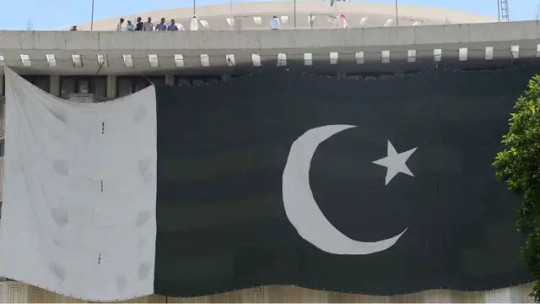
The widow of a prominent Pakistani journalist who was killed a year ago in Kenya filed a lawsuit on Wednesday against an elite Kenyan police unit she accuses of the wrongful death of her husband.
Javeria Siddique said she filed the lawsuit in Nairobi to get justice for her husband Arshad Sharif, a well-known journalist in his home country Pakistan. Sharif was shot dead on October 23, 2022 by officers from Kenya's General Service Unit, according to Pakistani authorities. The officers involved in the incident later claimed it was a case of mistaken identity.
In court papers seen by The Associated Press, Siddique wants Kenya’s Attorney General, the National Police Service and the Director of Public Prosecutions "to punish and prosecute the police officers who killed Arshad Sharif."
ARRESTS MADE IN CONNECTION TO MOSQUE ATTACK TARGETING ANTI-INDIA MILITANT IN PAKISTAN
The lawsuit also wants the court to direct the Attorney General "to issue a public apology, including an acknowledgement of the facts, and acceptance of responsibility to the family of Arshad Sharif within seven days of this court’s order."
"I am suing the GSU because they committed the crime openly, then admitted that it was a case of mistaken identity. But for me it was a targeted assassination because he was living in hiding in Kenya after receiving threats in Pakistan," Siddique said in a phone interview with the AP.
"The Kenyan government never issued any apology. They never contacted us, they never showed any kind of kindness toward us. It is really cruel for a government to be so insensitive," Siddique added.
Sharif, 50, was a vocal critic of Pakistan’s former army chief Qamar Javed Bajwa. He fled Pakistan last July to avoid arrest for criticizing the country’s powerful military and later arrived in Kenya.
A large Pakistani flag is draped over the side of a building, Lahore, Pakistan, August 12, 2022. (ARIF ALI/AFP via Getty Images)
Police in Nairobi said the journalist was shot and killed when he did not stop driving at a roadblock on the outskirts of the capital. The family, rights groups and Pakistani investigators countered that the killing was an assassination planned in Pakistan.
In Islamabad, police charged two Kenyan-based Pakistani businessmen, who had hosted Sharif in the East African country, with involvement in his killing.
Sharif’s mother wanted the Supreme Court of Pakistan to ensure the questioning of Bajwa and other former military officials she accused of involvement in conspiring to assassinate her son.
News of the killing shook Pakistan and thousands attended Sharif’s funeral as the nation mourned last year. Sharif's friends, family and colleagues have demanded justice for him on social media and held rallies across Pakistan to draw attention to the case.
PAKISTAN CLAIMS 2 CIVILIANS SHOT DEAD BY TALIBAN AT AFGHAN BORDER
The investigators’ 592-page report, issued last year, concluded that the Kenyan police issued contradictory statements following the killing of Sharif.
Pakistan’s military has denied any involvement in the killing of Sharif, and said it would support investigators examining who was behind it.
According to Kenyan police's website, the General Service Unit is tasked with providing security to the president and at strategic points, controlling civil disturbance and counter-terrorism.
CLICK HERE TO GET THE FOX NEWS APP
Kenya’s National Police Service and the Independent Policing Oversight Authority, a body responsible for holding the police to account, did not respond to AP’s requests to comment on the lawsuit.
Read the full article
0 notes
Link
Fomrer genelkurmay başkanı General (retd) Qamar Javed Bajwa (solda) ve eski casus şefi Faiz Hameed. — ISPR/X/DosyaİSLAMABAD: Eski genelkurmay başkanı General (emekli) Qamar Javed Bajwa ve eski casus şefi Korgeneral (emekli) Faiz Hameed, tartışmalı röportajları sebebiyle kendilerine karşı dava açılması amacıyla İslamabad Yüksek Mahkemesi'ne (IHC) sunulan bir dilekçenin peşinden Pazartesi günü tebligat aldılar.IHC Baş Yargıcı Aamer Farooq, eski askeri yetkililerin yanı sıra gazeteciler Javed Chaudhary, Shahid Maitla ve Pakistan Elektronik Medya Düzenleme Kurumu'na (Pemra) da yurttaş Atıf Ali'nin dilekçeleri hakkında bildirimler yayınladı. Dilekçede, gazetecilerin emekli generallerle meydana getirilen röportajları temel alarak toplumu "negatif tesir" yaratan iki yazı yazdıkları ve eski generalleri basın gösterim organlarında çeşitli vakalara ilişkin gerçekleri çarpıtarak emekli askerlere ilişkin yasaları ihlal etmekle suçladıkları iddia edildi. röportajlar.Başvurucu ek olarak, ifade özgürlüğü adı altında “kabahat eylemi” işlendiğini ve davanın tescili için talepte bulunulduğunu sadece hemen hemen herhangi bir işlem yapılmadığını ileri sürdü.İddiada, IHC'nin yetkililere bir davanın kaydedilmesi yönünde yönerge verilmesi istendi.Dilekçe sahibi, eski generaller Bajwa ve Faiz'in ulusal vakaları yanlış ve uydurma bir halde tasvir ederek lekelediğini iddia etti.Haberler ilgi çekebilmek için gazetecilik kisvesi altında devlet kurumlarının negatif imajını sunuyordu.Ek olarak bu vakalar bağlamında sürdürülen kampanyanın halkla devlet kurumları içinde güvensizlik yaratmaya yönelik bir girişim olduğu açıklandı.Bu senenin başlarında eski genelkurmay başkanının gazetecilerle yapmış olduğu röportajlarda PTI şefi Imran Khan'ın iktidardan devrilmesi, sivil-asker ilişkileri ve öteki mevzular da dahil olmak suretiyle çeşitli mevzuları tartıştığı bildirildi.
0 notes
Text
I was dangerous for Pakistan so General Bajwa removed me... Imran Khan's big allegation on former general
I was dangerous for Pakistan so General Bajwa removed me… Imran Khan’s big allegation on former general
Lahore: Pakistan’s former Prime Minister Imran Khan has made several revelations in an interview about the country’s former army chief General (retd) Qamar Javed Bajwa. Pakistan Tehreek-e-Insaf (PTI) chief Imran said that efforts to remove him had started from the time he was the country’s…

View On WordPress
0 notes
Text
Imran Khan's Big Charge Against Pak's Former Army Chief
The deposed premier, who was voted out of office in April last year after a no-confidence motion, said the Intelligence Bureau (IB) chief told him that Bajwa wanted to bring Shehbaz Sharif into power.

Islamabad: Pakistan Tehreek-e-Insaf (PTI) chairman Imran Khan said he dissolved the provincial assemblies of Punjab and Khyber Pakhtunkhwa (KP) after the former army chief General Qamar Javed Bajwa advised him to do so, The News.com reported.
During a meeting with General Bajwa where President Arif Alvi was also present, the former army chief suggested that if the PTI chief sought elections, he should first dissolve his governments in the two provinces, Khan said in a recent interview with a private news channel on Sunday, The News.com reported.
The deposed premier, who was voted out of office in April last year after a no-confidence motion, said the Intelligence Bureau (IB) chief told him that Bajwa wanted to bring Shehbaz Sharif into power.
"General Bajwa and the [premier intelligence] agency knew that the current rulers had stolen the money from the national kitty and taken it abroad. Despite knowing this, General Bajwa was willing to give them 'NRO' as he had planned an extension [for himself]," Khan said.
During the interview, Imran Khan added that the polls can take place in July if Prime Minister Shehbaz Sharif dissolves the National Assembly, the lower house of parliament.
"Elections can be held in July if the prime minister dissolves the assembly," the ousted premier said.
He also stressed that caretaker governments in both Punjab and Khyber Pakhtunkhwa (KP), the provinces where Khan's party was in power before he decided to dissolve its two assemblies on January 14 and 18, respectively, are illegal after the lapse of their stipulated term, The News.com reported.
He demanded that the caretaker government be abolished and a new "neutral" interim setup be instated.
He added that the Supreme Court of Pakistan has given May 14 as the date for Punjab polls and his party won't let the government go beyond that.
"If they think they [incumbent government] will pressurise the Supreme Court, we will not let it happen. They will scandalise the top court to run away from elections," he said.
In response to the PTI's call for elections in the two provinces, the government has, time and again, insisted on conducting elections, to the national and provincial assemblies, together in October, The News.com reported.
A three-member bench of the Supreme Court had fixed May 14 as the new date for the election to the Punjab Assembly, quashing the Election Commission of Pakistan's (ECP) decision to extend the polls date from April 10 to Oct 8.
While security has been cited as a major concern for the government to refuse to hold the polls, the lack of funds for carrying out the task has also been communicated as the main reason for their insistence on delay.
The PTI chief shared the suggestion while refusing to back down from his demand for the snap polls. "There may be no money even in October. The situation may worsen. We cannot go beyond May 14."
The former prime minister further said that inflation irked the public, and the government is running away from its reaction by postponing the elections.
"They are scared of elections," he said censuring the Shehbaz-led administration.
Khan insisted that the ECP is working in connivance with the ruling Pakistan Democratic Movement (PDM), an alliance of 13 political parties.
"Maryam Nawaz is receiving protocol. The election commission is with them," he said, directing his criticism towards the electoral body and Pakistan Muslim League-Nawaz (PML-N) senior vice-president.
Commenting on talks with the ruling alliance in Islamabad, Khan said he had given the mandate of negotiations to his party's Vice Chairman Shah Mahmood Qureshi and not to Asad Qaisar, the former speaker of the National Assembly, The News.com reported.
"There has been no discussion on negotiations with Shah Mahmood Qureshi so far," he said amid reports that some major political parties had reached out to the PTI.
Earlier this week, the CJP Bandial said the top court could make some room and change the date of elections if all the political parties evolve a consensus to hold talks. The court had earlier also stressed on political parties to sit together to resolve the issues.
Pakistan Peoples Party (PPP) co-chairman Asif Ali Zardari, meanwhile, expressed his support for the proposal, calling on his allies and all other political parties to come together and try to end the ongoing crises, The News.com reported.
PPP senior leader Qamar Zaman Kaira also confirmed that the ruling alliance made a contact with the PTI. Jamaat-e-Islami (JI) Emir Siraj Ul Haq has also been actively trying to build a bridge between the PTI and the coalition parties in the government.
Khan, however, claimed that the government would use negotiations to further delay the polls.
0 notes
Text
0 notes
Photo
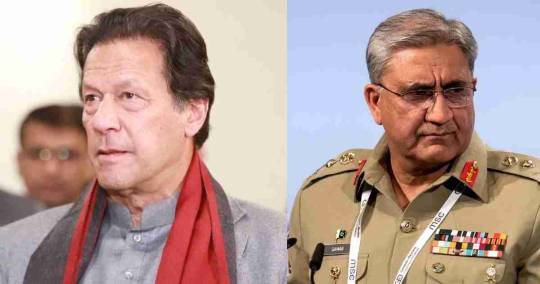
(via In another U-turn, Pak Army & Rangers are being deployed for Punjab by-elections - Policy Pursuit)
0 notes
Text
ukraine russia news | russia ukraine | imran khan | Pakistani news | world news
‘I wanted to follow the path of India, but…, Imran again exposed Bajwa’s secret
Pakistan’s ousted Prime Minister Imran Khan has claimed that former army chief General Qamar Javed Bajwa wanted him to condemn Russia for its invasion of Ukraine, but he refused to do so citing the example of India.
Imran Khan has once again attacked former Army, Chief Bajwa. (Photo-Shakti knowledge)
Lahore:…
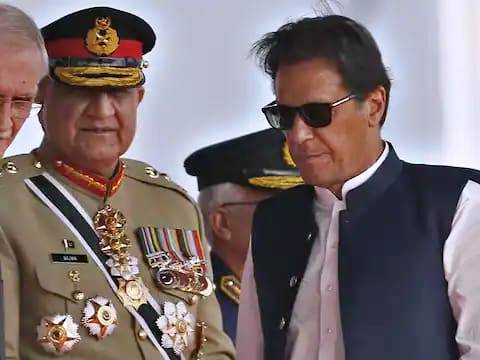
View On WordPress
0 notes
Text
'General Bajwa wanted me to condemn Russia for Ukraine invasion': Imran Khan
Former Pakistan Prime Minister Imran Khan has alleged that former Army chief General Qamar Javed Bajwa wanted him to condemn Russia for invading Ukraine, but he decided to stay ‘neutral’, citing India’s example.
Former Pakistan Prime Minister Imran Khan (left) said former Army chief General Qamar Javed Bajwa (right) wanted him to condemn Russia for invading Ukraine to appease the US.
By India…
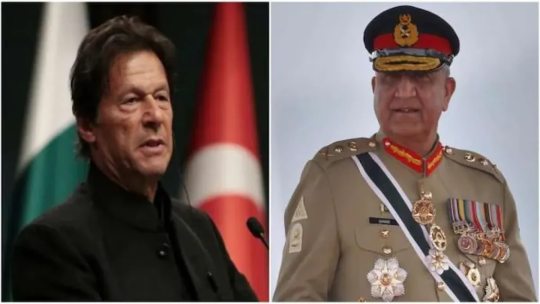
View On WordPress
0 notes